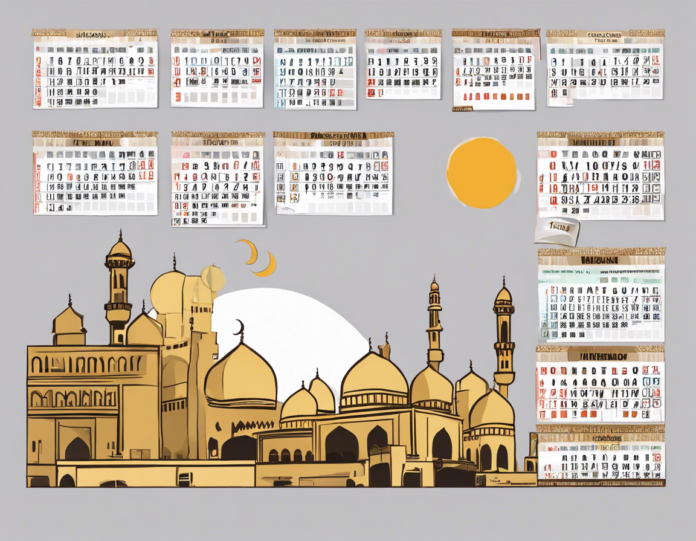Ramadan, known as the holiest month in Islam, is a significant time for Muslims worldwide. During this month, followers of the Islamic faith engage in fasting from dawn until sunset, prayer, reflection, charity, and community gatherings. One essential aspect of Ramadan preparation is the Ramadan Calendar, which helps individuals keep track of the timing for each day, including the pre-dawn meal (Suhoor), the fast-breaking meal at sunset (Iftar), and the various prayer times. In this comprehensive guide, we will delve into the significance of Ramadan, the elements of the Ramadan Calendar, and tips for maximizing the spiritual benefits during this sacred month.
Ramadan: A Time for Spiritual Reflection and Renewal
Ramadan is the ninth month of the Islamic lunar calendar, during which the Quran, the holy book of Islam, is believed to have been revealed to the Prophet Muhammad. It is a time of spiritual reflection, increased devotion, and self-discipline. The primary focus of Ramadan is fasting (Sawm), which is considered one of the Five Pillars of Islam. Fasting during Ramadan is obligatory for all adult Muslims, with certain exceptions (such as illness, pregnancy, or menstruation).
Fasting in Ramadan involves abstaining from food, drink, smoking, and marital relations from dawn (Fajr) until sunset (Maghrib). This act of self-denial is meant to purify the soul, develop self-discipline, and foster empathy for the less fortunate. In addition to fasting, Muslims are encouraged to increase their prayers, recitation of the Quran, acts of charity (Zakat), and strive for personal growth and improvement.
Understanding the Ramadan Calendar
The Ramadan Calendar plays a crucial role in helping Muslims organize their day during this holy month. It provides essential information such as the sunset and sunrise times, prayer timings, and the times for Suhoor and Iftar. The calendar is based on the lunar Hijri calendar, which consists of 12 months of 29 or 30 days depending on the sighting of the moon.
Elements of the Ramadan Calendar
Suhoor Time
- Suhoor is the pre-dawn meal consumed before the Fajr prayer.
- It is recommended to have a wholesome and nutritious meal during Suhoor to sustain through the day of fasting.
Iftar Time
- Iftar is the evening meal to break the fast at sunset.
- Traditionally, dates and water are consumed first to break the fast, followed by a larger meal.
Prayer Times
- The five daily prayers (Fajr, Dhuhr, Asr, Maghrib, Isha) have specific timings that change slightly each day.
- The Taraweeh prayer, which is performed during Ramadan, is an optional prayer that takes place after the Isha prayer.
Charity and Community Events
- Ramadan is a time of heightened charity and community involvement.
- Many mosques and organizations host Iftar meals for the community, and individuals are encouraged to give to those in need.
Tips for Maximizing the Spiritual Benefits of Ramadan
-
Set Intentions: Approach Ramadan with a sincere intention to improve spiritually and grow closer to the Creator.
-
Plan Your Days: Create a schedule that includes time for prayer, Quran recitation, reflection, and acts of charity.
-
Healthy Eating: Opt for nutritious foods during Suhoor and Iftar to maintain energy levels throughout the day.
-
Increase Acts of Worship: Besides fasting and praying, engage in acts such as voluntary prayers, supplications (dua), and seeking forgiveness.
-
Reflect and Repent: Use this month to reflect on one’s actions, seek forgiveness for past mistakes, and make a commitment to positive change.
-
Engage in Community: Participate in community events, iftars, and volunteer opportunities to enhance the spirit of togetherness.
-
Maintain Consistency: Aim to maintain the positive habits developed during Ramadan beyond the month itself.
Frequently Asked Questions (FAQs)
1. What is the significance of fasting during Ramadan?
Fasting during Ramadan is a pillar of Islam that helps Muslims develop self-discipline, empathy for the less fortunate, and achieve spiritual growth.
2. How is the beginning of Ramadan determined?
The beginning of Ramadan is determined by the sighting of the new moon, following the lunar Hijri calendar.
3. Can children or the elderly fast during Ramadan?
Children are not obligated to fast until they reach puberty, while the elderly or those with health conditions are exempt from fasting.
4. What should one do if they accidentally break their fast?
If someone accidentally breaks their fast, they should repent, make up for the broken day by fasting at a later date, and offer a charitable donation.
5. How can non-Muslims support their Muslim friends during Ramadan?
Non-Muslims can show support by being understanding of their friends’ fasting schedule, participating in community events, and sharing in the spirit of Ramadan.
6. Is it permissible to fast while traveling?
Travelers are allowed to postpone their fast and make up for the missed days after Ramadan, following the concept of Qada’.
7. What is Laylat al-Qadr and why is it significant?
Laylat al-Qadr, also known as the Night of Decree, is considered the holiest night of the year in Islam, when the Quran was first revealed to the Prophet Muhammad.
In conclusion, the Ramadan Calendar serves as a guide to help Muslims navigate through the month of fasting, prayer, and reflection. By understanding the significance of Ramadan, incorporating the elements of the Ramadan Calendar, and following tips for spiritual growth, individuals can make the most of this sacred time. Through fasting, prayer, and acts of charity, Muslims seek to deepen their connection with the divine and grow in faith and mindfulness.








